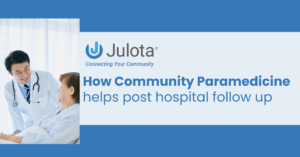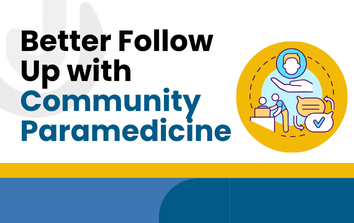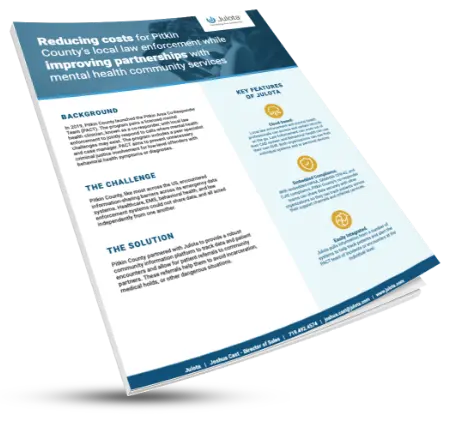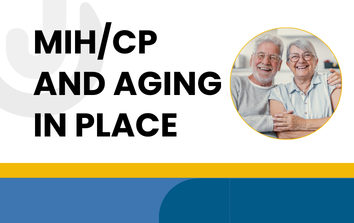Community paramedicine supports post-hospital follow-up initiatives by providing essential services, such as medication check-ins, documentation of vital signs, and helping individuals acclimatize to a new environment. Community paramedics are trained in a wide variety of patient care, making them particularly suited to offering quality post-hospital care.

Post-Hospital Follow-Up: How Mobile Integrated Health-Community Paramedicine Makes a Difference
In the critical phases when someone is released from the hospital, community paramedicine can play a pivotal role. Post-hospital follow-up involves a provider checking in on a patient in the days, weeks, and months following a hospital stay. The goal is lasting recovery and fewer readmissions.
That’s where community paramedicine comes into play. Instead of passively hoping that people will follow their post-hospital care plans, community paramedics take an active role in home care, ensuring that people have what they need to make a full and long-lasting recovery.
Here is how community paramedicine helps post-hospital follow-up:
- Community Paramedics Help by Assessing the Person’s Condition and Finding any Problems with Discharge Plans
- By Helping People Adapt to Their Environment After a Long Hospital Stay
- Providing Patients with Resources and Numbers to Call for Help
- Delivering Follow-Up Care and Medication Management
- Integrating the Post Hospital Care Environment (Bringing Everyone Together)
You will find more nuances and context to these points in the sections below.
Community Paramedics Help by Assessing the Person’s Condition and Finding any Problems with Discharge Plans
The simplest way community paramedics assist people after hospital discharge is by visiting them at home (in some cases, the paramedic might even meet them on the day of discharge).
At this point, the community paramedic is working to ensure two main things: that the person has what they need and that they understand their discharge instructions. Sometimes, the community paramedic will even catch an issue with post-hospital stay instructions.
For example, if the discharge instructions encourage the patient to take a short walk each day, the paramedic will ensure that this is possible. In some cases, the patient may be comfortable walking but uncomfortable using stairs. If they don’t have a ramp to get out of their home, then they’ll have a lot of trouble taking a walk.
Further, the community paramedic can check that the patient has everything they need for medication management, including ensuring they have a safe place to store their meds and a way to keep them organized.
If, after reviewing the discharge instructions, the patient has any questions or concerns, the community paramedic can help guide them in the right direction. In this way, the community paramedic ensures that they are optimized for a full recovery.
Post Hospital Care and Community Paramedicine: Helping People Adapt to Their Environment After a Long Hospital Stay
We alluded to some of the difficulties with transitioning from the hospital back to the home in the last section, but let’s talk about more details.
Many times, when people are in the hospital, they build up a kind of reliance on the staff and the environment. All their meds are taken care of at precisely the right time, and there are handlebars in the bathroom and a cord to pull if the patient needs help. Not only that, but the bed mattress is designed to reduce the risk of pressure ulcers, and the rooms are usually kept exceptionally clean.
What happens when the patient goes home? Not only is the patient still weak from recovering from an illness, but now they are trying to manage a bunch of new things in a new place.
The community paramedic can help the patient thrive during this transition. Not only are they often available to answer questions, but they can also physically visit the patient’s home to ensure that their environment is suitable for post-hospital recovery.
The goal is to give the patient confidence in their recovery and to reduce the chance of relapsing disease and hospital readmission.
Providing Patients with Resources and Numbers to Call for Help: Post-Hospital Care and Community Paramedicine
Community paramedics can also connect patients with resources that could be a big help in their post-hospital care plan. For example, if the patient needs to continue taking a medication and they can’t miss it, the community paramedic could help facilitate a medication delivery service.
Furthermore, if the patient is struggling with depression related to their condition or social isolation, the community paramedic can connect the patient to mental health services and social workers. In some cases, these services offer more than just a phone call; they will actually visit the patient in their home and try to provide care outside a treatment facility.
The big difference is that not only does community paramedicine provide the number to call, but they will actually make that call for the patient. One of the significant gaps in healthcare exists not in a lack of resources, but in a lack of communication.
There are many reasons a patient might not call for a service, even if it could be beneficial. One of the big reasons is that people stick with what they’re comfortable with. Most people understand how their primary care physician and the emergency department work. As a result, these are the places they will go and the people they will call until they find something better.
The problem is, to find something better, they need to take a leap of faith – and many people aren’t comfortable with this. The community paramedic can act as a go-between, creating connections to help improve engagement while offering helpful resources that build patient trust.
Post Hospital Care and Community Paramedicine: Delivering Follow Up Care and Medication Management
Sometimes, a patient will be discharged from a hospital, but still require some active care. This could be as simple as a routine check of their vital signs, or it could be more involved, such as blood draws or physical therapy. Whatever the care they need in the post-hospital setting, community paramedics can help them find it.
A big area where community paramedics can help is with medications. While this might seem like a small thing, some significant nuances are easy to overlook. First, community paramedics can ensure that the patient has an organized system for their medications. When patients have organized systems, they are less likely to accidentally overdose on a medication (or accidentally miss a vital dose).
Furthermore, if a community paramedic can assist someone with their medications, they may be able to help reduce dependence on things like pain meds. The community paramedic can find other ways to deal with a person’s pain that don’t rely so heavily on potent drugs.
Often, community paramedics are trained in wound care, ECG reading and transmission, as well as checking key vital sign parameters that could indicate a change in the patients’ care. With a community paramedic involved in post-hospital care, the patient is less likely to spiral into a dangerous healthcare cycle and more likely to find lasting health.
Post Hospital Care and Community Paramedicine: Integrating the Post Hospital Care Environment (Bringing Everyone Together)
One of the best jobs the community paramedic has in the post-hospital care plan is ensuring that all healthcare providers are on the same page. This means that MIH-CP creates a central network where care providers can seamlessly communicate and safely share key patient information.
This means that services like mental healthcare, substance abuse recovery, and primary patient care can all closely watch the patient and respond when something flags their attention. When healthcare providers work together like this, they are much more likely to bring a lasting recovery to people in the post hospital phase.
A key reason that community paramedics can facilitate this network is by using great tools, such as the integrated platform offered by Julota. Their software tools allow people to communicate freely, even if they are not in the same department or corporation.
Key Points: How Community Paramedicine Can Help People After a Long Hospital Stay
Community paramedics can offer critical services to those in the post hospital phase of their care. In many cases, getting out of the hospital is just the beginning of their recovery.
Community paramedicine teams can ensure that the patient understands their discharge instructions, has all their medications in order, and knows who to call if they experience any change in their condition.
Contact Julota for more information on how their tools can help your MIH-CP program with post-hospital follow up.
Author
-

Noah Weinberg is a Marketing Associate at Julota, where he focuses on elevating the alternative response space, specifically Mobile Integrated Healthcare (MIH), Community Paramedicine, and co-responder models. He writes about the intersection of law enforcement, healthcare, and community well-being, drawing on real-world experiences with community paramedicine programs in Ontario, Canada.




